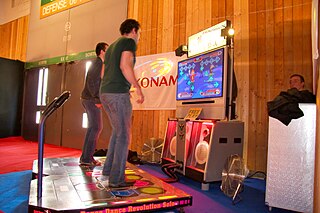A massively multiplayer online role-playing game (MMORPG) is a video game that combines aspects of a role-playing video game and a massively multiplayer online game.
Educational games are games explicitly designed with educational purposes, or which have incidental or secondary educational value. All types of games may be used in an educational environment, however educational games are games that are designed to help people learn about certain subjects, expand concepts, reinforce development, understand a historical event or culture, or assist them in learning a skill as they play. Game types include board, card, and video games.

Second Life is a multiplayer virtual world that allows people to create an avatar for themselves and then interact with other users and user-created content within a multi-user online environment. Developed and owned by the San Francisco-based firm Linden Lab and launched on June 23, 2003, it saw rapid growth for some years and in 2013 it had approximately one million regular users. Growth eventually stabilized, and by the end of 2017, the active user count had fallen to "between 800,000 and 900,000". In many ways, Second Life is similar to massively multiplayer online role-playing games; nevertheless, Linden Lab is emphatic that their creation is not a game: "There is no manufactured conflict, no set objective."

A virtual world is a computer-simulated environment which may be populated by many simultaneous users who can create a personal avatar and independently explore the virtual world, participate in its activities, and communicate with others. These avatars can be textual, graphical representations, or live video avatars with auditory and touch sensations. Virtual worlds are closely related to mirror worlds.

Furcadia is a free-to-play MMOSG/MMORPG or graphical MUD, set in a fantasy world inhabited by magical creatures. The game is based on user-created content with emphasis on world building tools, exploring, socializing, and free-form roleplaying. Furcadia hosts a large volunteer program called the Beekin Helpers, allowing players to help with community moderation, welcoming new players, handling in-game technical support, running in game events, creating art for the game itself, accessing and updating the game's website, and bug hunting. Furcadia holds the Guinness World Records title for the longest continuously running social MMORPG and, in addition to being one of the first games to heavily encourage modding and let users build virtual worlds for themselves, it was also one of the first freemium online games. In 2008, Furcadia was reported as having over 60,000 players.

In computing, an avatar is a graphical representation of a user, the user's character, or persona. Avatars can be two-dimensional icons in Internet forums and other online communities, where they are also known as profile pictures, userpics, or formerly picons. Alternatively, an avatar can take the form of a three-dimensional model, as used in online worlds and video games, or an imaginary character with no graphical appearance, as in text-based games or worlds such as MUDs.

Rhythm game or rhythm action is a genre of music-themed action video game that challenges a player's sense of rhythm. Games in the genre typically focus on dance or the simulated performance of musical instruments, and require players to press buttons in a sequence dictated on the screen. Many rhythm games include multiplayer modes in which players compete for the highest score or cooperate as a simulated musical ensemble. Rhythm games often feature novel game controllers shaped like musical instruments such as guitars and drums to match notes while playing songs. Certain dance-based games require the player to physically dance on a mat, with pressure-sensitive pads acting as the input device.

Three Rings Design, Inc. was an online game developer that was founded on March 30, 2001, by Daniel James and Michael Bayne. The company was named in honor of the Three Rings of the Elven-kings in Tolkien mythology.
Virtual crime, can be described as a criminal act conducted in a virtual world -- usually massively multiplayer online role-playing games, MMORPGs. To grasp the definition of virtual crime, the modern interpretation of the term "virtual" must be assessed to portray the implications of virtual crime. In this sense, virtual crime describes those online acts that “evoke the effects of real crime” but are not widely considered to be prosecutable acts.
Gold farming is the practice of playing a massively multiplayer online game (MMO) to acquire in-game currency, later selling it for real-world money.
In the virtual world of Second Life, there are a number of in-world business and user-groups founded specifically for the game, some of which have become legal entities in their own right, as well as preexisting companies and organizations that have involved themselves in the world.
Horrible Histories is an educational entertainment franchise encompassing many media including books, magazines, audio books, stage shows, TV shows, and more.
Dizzywood was an online game and virtual world developed in San Francisco, California by the entertainment company Rocket Paper Scissors, LLC. It is designed for children between the ages of 8 and 14 years old and has a focus on teamwork, cooperation and collaborative play. The company received funding from well-known investors including Shelby Bonnie and Charles River Ventures. Dizzywood was launched into public beta in November, 2007 and has grown rapidly, reaching over 400,000 monthly global visitors. Most visitors come from the United States and other English-speaking countries. The game is a visual chat and social game application similar to Club Penguin or Habbo Hotel, with adventure and quest components similar to RuneScape and other MMO games. It was free to play until the introduction of bonuses and extras that required paying to be a "Gold" or "Silver Explorer". The game officially closed December 31, 2010.
The Day of the Clown is the second serial of the second series of the British science fiction television series The Sarah Jane Adventures. It was first broadcast in two weekly parts on the CBBC channel on 6 and 13 October 2008. The Day of the Clown introduces main character Rani Chandra and her parents, Haresh and Gita Chandra, and they would stay for the rest of the series.
Virtual goods are non-physical objects and money purchased for use in online communities or online games. Digital goods, on the other hand, may be a broader category including digital books, music, and movies. Virtual goods are intangible by definition.

MyCoke was an online chat game used for marketing the Coca-Cola brand and products. It was created in January 2002 by VML Inc an Atlanta-based digital agency using core technology from Sulake Corporation, the company responsible for a similar popular online game called Habbo Hotel. Version 2 of the game was released in late 2004 on a new technology platform called Galapagos, created by Studiocom, and featuring new locations and a special double-reward 'Coca-Cola Red Room'.

3DiTeams is a first person serious video game developed by the Duke University Medical Center and Virtual Heroes and used for medical education and team training. The 3DiTeams Project was conceived by Dr. Jeffrey M. Taekman and Jerry Heneghan and is managed by the Human Simulation and Patient Safety Center at Duke University Medical Center, Durham, North Carolina.

Webosaurs was a massively multiplayer online game developed by American studio Reel FX Entertainment. Players explored a virtual world using dinosaur avatars and could socialize with other players, play mini-games, and decorate their homes. Beta-testing started on June 25, 2009, with the game officially launching on October 22, 2009. In 2012, the Webosaurs servers were shut down.

Jumanji is an American media franchise, based on the children's book Jumanji (1981) and its sequel Zathura (2002), written by Chris Van Allsburg. The first film was produced by TriStar Pictures, and subsequent films by Columbia Pictures, both subsidiaries of Sony Pictures. The franchise follows the adventures of various people who find themselves imperiled when playing an enchanted game that comes with a variety of dangerous jungle elements that the players must survive as they play. Ultimately, the only way to end the disruptions is to finish the game while enduring its dangers.

VRChat is an online virtual world platform created by Graham Gaylor and Jesse Joudrey and operated by VRChat, Inc. The platform allows users to interact with others with user-created 3D avatars and worlds. VRChat is designed primarily for use with virtual reality headsets, being available for Microsoft Windows PCs and as a native app for Android-based headsets such as the Meta Quest, Pico 4, and HTC Vive XR Elite. It is also usable without VR in a "desktop" mode designed for either a mouse and keyboard or gamepad, and in an Android app for touchscreen devices.











